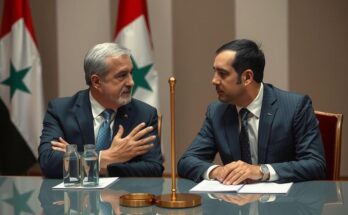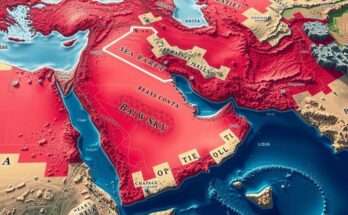This article explores the complex geopolitical dynamics arising from the Israel-Iran escalation and its implications for Russia. As Moscow grapples with its military dependence on Iran amid the conflict in Ukraine, it simultaneously seeks to navigate the delicate balance of regional stability and US rivalry, all while observing the significant aftermath of renewed violence in Lebanon.
The current Israeli-Iranian escalation presents a complex scenario for Russia, which finds itself entwined in a delicate web of alliances and geopolitical maneuvers. Anna Levina, a Russian researcher situated in Beirut, has experienced the dire consequences of this conflict firsthand, as she prepares for potential assaults on Lebanon following a surge in Israeli missile strikes that have claimed thousands of lives, including numerous civilians. The ongoing hostilities reflect broader geopolitical dynamics wherein Russia’s foreign policy seeks to establish a multipolar world that contrasts sharply with the US’s predominance in international affairs. Analysts underscore Russia’s concerns regarding the escalating confrontations between Israel and Iran, as well as the mounting violence in Lebanon. Despite these apprehensions, the Kremlin’s response has often favored a strategic taciturnity, urging diplomatic resolutions while navigating its military reliance on Iran, especially in the context of the ongoing conflict in Ukraine. Russian officials, including those in the Ministry of Foreign Affairs, have criticized Israel’s military actions in Lebanon, advocating for the withdrawal of Israeli troops and signaling a desire for regional stability. Although Russia has benefitted from its collaboration with Iran in military endeavors, particularly given the increasing demand for Iranian arms and resources, experts like Ruslan Suleymanov assert that Russia’s position results in a precarious imbalance of influence—suggesting Moscow may be bound to align with the Iranian sphere of influence. However, both Malinin and Suleymanov concur that while Russia perceives utility in the chaos stemming from the conflict—primarily as a diversion for the United States from its commitments in Ukraine—it remains steadfast in its desire to avoid the escalation of a full-scale war that could destabilize its interests in the region. Russia’s historical relations with Lebanon and Hezbollah are also nuanced; remnants of Soviet diplomacy linger, yet the Kremlin’s stance remains cautious as it seeks strategic partnerships without overcommitment. Ultimately, as the situation evolves, Levina highlights a sense of historical repetition in Israel’s military strategies, positing that the current ground invasion may echo past miscalculations. Thus, the future remains unpredictable as Russia balances its complex affiliations in the region.
This article examines the intricate relationship between Russia and the ongoing escalation of hostilities involving Israel and Iran, particularly in the context of the Israeli military actions against Lebanon and Hezbollah. With significant military collaborations between Russia and Iran shaping Moscow’s stance, particularly in the backdrop of the war in Ukraine, this analysis elucidates the various layers of diplomatic and military strategies employed by Russia amid the increasing tensions. The historical context of Soviet influence in Lebanon and its implications for contemporary interactions further complicate Russia’s role in the current crisis.
In summary, the geopolitical tensions between Israel and Iran, exacerbated by military actions in Lebanon, present both challenges and opportunities for Russia. While Russia is pivoting towards Iran for military support, it is equally wary of the potential fallout from an unwarranted war. As Moscow navigates its complex alliances, the situation remains volatile, with historical patterns possibly informing future developments. Russia’s overarching goal continues to be the maintenance of regional stability while countering US influence.
Original Source: www.aljazeera.com




